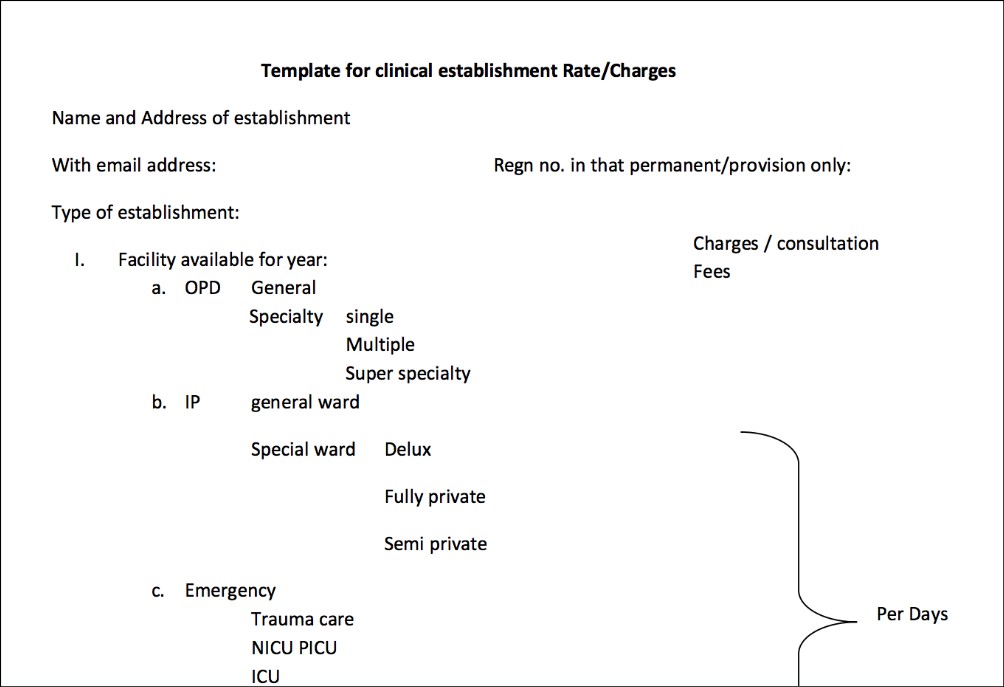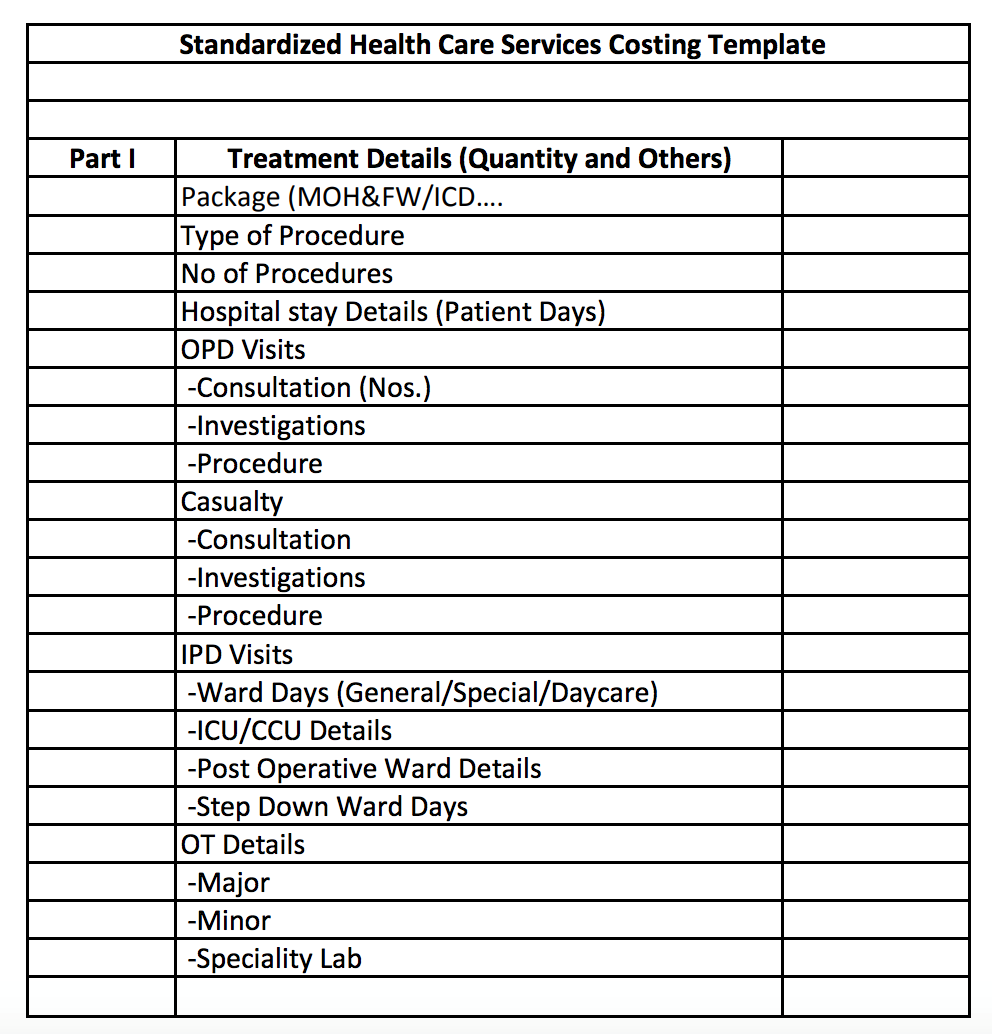[orc]The government has placed a draft ‘Charter of Patient Rights’ that recognizes 17 rights of a patient. Here is a low down of these 17 rights.
With the widespread expansion of private health care facilities, many citizens now choose private facilities over public health facilities. The patients are often at the receiving end in terms of charges, opaqueness in processes etc. Even the government regulation in this area has been found wanting. The Ministry of Health & Family Welfare, Government of India has now proposed a ‘Charter of Patient Rights’ to be implemented by state governments. The draft is now available in the public domain & comments are invited till 30th September 2018.
What is the current status of Patient rights in India?
Government of India has enacted the Clinical Establishments (Registration and Regulation) Act in 2010 and notified the Clinical Establishments (Central Government) Rules, 2012. The act and the rules provide for the following.
- Registration and regulation of Clinical Establishments including those in the private sector (includes both allopathic and AYUSH systems of medicine, Therapeutic, diagnostic establishments)
- All such clinical establishments are required to meet the following norms
- Minimum standards of facilities and services
- Minimum requirement of personnel, maintenance of records and reports
- Displaying of rates at a conspicuous place.
- Follow Standard Treatment Guidelines issued by the Central/State Governments
- Charge rates for each type of procedure and service within the range of rates as determined from time to time
The National Council for Clinical Establishments has approved a standard list of medical procedures and a standard template for costing of medical procedures. As per the act, the States are responsible for regulating private hospitals in their respective States as per provisions of the act to ensure quality care. As per information shared by the government in the Rajya Sabha, only 11 States/UTs have adopted and passed a state level act to implement this. Some states have enacted their own version of the law while a few other states are yet to enact any law on these lines.
Need for a charter of ‘Patient Rights’
As per the document released by the government, legal provisions related to Patient Rights in India are scattered across different legal documents like the Constitution of India, Article 21, Indian Medical Council Regulations 2002, The Consumer Protection Act 1986, Drugs and Cosmetic Act 1940, Clinical Establishment Act 2010 etc. The charter that is now placed in the public domain is expected to become a guiding document for governments to formulate concrete mechanism for their implementation.
What are part of the Patient Rights?
The charter defines 17 rights of a patient listed below.
Right to Information: Every patient has a right to adequate & relevant information about the nature, cause of illness, provisional/confirmed diagnosis, proposed investigations and management, and possible complications to be explained at their level of understanding in language known to them. Patients and their caretakers also have a right to know the identity and professional status of various care providers who are providing service to him/her.
Right to records and reports: Every patient or his caregiver has the right to access originals/copies of case papers, indoor patient records, investigation reports (during period of admission, preferably within 24 hours and after discharge, within 72 hours). This should be made available after paying appropriate fees for photocopying or allowed to be photocopied by patients at their cost.
Right to Emergency Medical Care: As per Supreme Court, all hospitals both in the government and in the private sector are duty bound to provide basic Emergency Medical Care, and injured persons have a right to get Emergency Medical Care. Such care must be initiated without demanding payment/advance and basic care should be provided to the patient irrespective of paying capacity.
Right to informed consent: Every patient has a right that informed consent must be sought prior to any potentially hazardous test/treatment (e.g. invasive investigation/surgery/chemotherapy) which carries certain risks.
Right to confidentiality, human dignity and privacy: All patients have a right to privacy, and doctors have a duty to hold information about their health condition and treatment plan in strict confidentiality, unless it is essential in specific circumstances to communicate such information in the interest of protecting other or due to public health considerations.
Right to second opinion: Every patient has the right to seek second opinion from an appropriate clinician of patients’ or caregivers’ choice. The hospital management has a duty to respect the patient’s right to second opinion, and should provide to the patient’s caregivers all necessary records and information required for seeking such opinion without any extra cost or delay.
Right to transparency in rates and care as per prescribed rates: Every patient and their caregivers have a right to information on the rates to be charged by the hospital for each type of service provided and facilities available on a prominent display board and a brochure. They have a right to receive an itemized detailed bill at the time of payment. It would be the duty of the to display key rates at a conspicuous place in local as well as English language, and to make available the detailed schedule of rates in a booklet form to all patients/caregivers.
 Right to non-discrimination: Every patient has the right to receive treatment without any discrimination based on his or her illnesses or conditions, including HIV status or other health condition, religion, caste, ethnicity, gender, age, sexual orientation, linguistic or geographical/social origins.
Right to non-discrimination: Every patient has the right to receive treatment without any discrimination based on his or her illnesses or conditions, including HIV status or other health condition, religion, caste, ethnicity, gender, age, sexual orientation, linguistic or geographical/social origins.
Right to safety and quality care according to standards: Patients have a right to safety and security in the hospital premises. They have a right to be provided with care in an environment having requisite cleanliness, infection control measures, safe drinking water as per BIS/FSSAI Standards and sanitation facilities.
Right to choose alternative treatment options if available: Patients and their caregivers have a right to choose between alternative treatment/management options, if these are available, after considering all aspects of the situation. This includes the option of the patient refusing care after considering all available options, with responsibility for consequences being borne by the patient and his/her caregivers.
Right to choose source for obtaining medicines or tests: When any medicine is prescribed by a doctor or a hospital, the patients and their caregivers have the right to choose any registered pharmacy of their choice to purchase them. Similarly, when a particular investigation is advised by a doctor or a hospital, the patient and his caregiver have a right to obtain this investigation from any registered diagnostic centre/laboratory having qualified personnel and accredited by National Accreditation Board for Laboratories (NABL).
Right to proper referral and transfer, which is free from perverse commercial influences: A patient has the right to continuity of care, and the right to be duly registered at the first healthcare facility where treatment has been sought, as well as at any subsequent facilities where care is sought.
Right to protection for patients involved in clinical trials: Every person/patient who is approached to participate in a clinical trial has a right to due protection. All clinical trials must be conducted in compliance with the protocols and good clinical practice guidelines issued by Central Drugs Standard Control Organisation and other applicable provisions.
Right to protection of participants involved in biomedical and health research: Every patient who is taking part in biomedical research shall be referred to as research participant and every research participant has a right to due protection. Any research involving such participants should follow the National Ethical Guidelines for Biomedical and Health Research involving Human participants.
Right to take discharge of patient, or receive body of deceased from hospital: A patient has the right to take discharge and cannot be detained in a hospital, on procedural grounds such as dispute in payment of hospital charges. Similarly, caretakers have the right to the dead body of a patient who had been treated in a hospital and the dead body cannot be detailed on procedural grounds, including nonpayment/dispute regarding payment of hospital charges against wishes of the caretakers.
Right to Patient Education: Patients have the right to receive education about major facts relevant to his/her condition and healthy living practices, their rights and responsibilities, officially supported health insurance schemes relevant to the patient, relevant entitlements in case of charitable hospitals, and how to seek redressal of grievances in the language the patients understand or seek the education.
Right to be heard and seek redressal: Every patient and their caregivers have the right to give feedback, make comments, or lodge complaints about the health care they are receiving or had received from a doctor or hospital. This includes the right to be given information and advice on how to give feedback, make comments, or make a complaint in a simple and user-friendly manner.
Patients and caregivers have the right to seek redressal in case they are aggrieved, on account of infringement of any of the above mentioned rights in this charter. This may be done by lodging a complaint with an official designated for this purpose by the hospital and further with an official mechanism constituted by the government.
The draft charter also seeks to establish a robust grievance redress mechanism for the protection of these rights. Those wishing to send Comments should do so by 30th September 2018 to the following contacts. Featured Image: By Gospel For Asia[CC BY-SA 4.0 ]
Featured Image: By Gospel For Asia[CC BY-SA 4.0 ]


